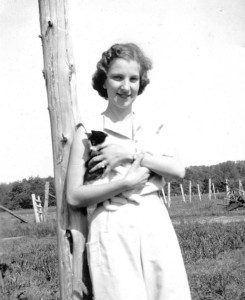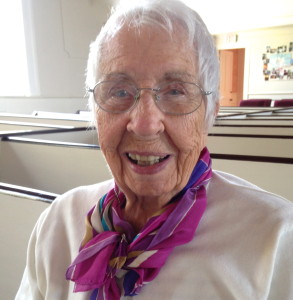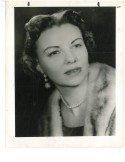Coming of Age in Plainfield:
Women’s Stories of Successful Aging
Rebecca Williams Mlynarczyk
As a nation and as a town, we are getting older. Life expectancy has been rising steadily since about 1840. In 1900 the average life expectancy in the United States was 47. A baby born today is expected to live, on average, to age 79. If the increase in life expectancy remains steady, a baby born in 2050 will have a life expectancy of 88 years, and by the end of the century the average will have risen to 100. (All statistics are taken from “What Happens When We All Live to 100?” by Gregg Easterbrook, The Atlantic, October 2014, pp. 61-72.)
What is society doing to prepare for this huge and rapid demographic shift? And what can we as individuals do to make these extra years more meaningful and enjoyable? Searching for possible role models of successful aging, I thought of a group of women here in Plainfield, a small town in the hills of western Massachusetts where I have been spending summers and weekends since 1973. Despite their advanced ages, these women were still vitally involved in living. To me, they exemplify what it means to age successfully.
Participants
In the summer of 2007, I began an oral history project to learn some of the secrets of successful aging. Three of the participants were “transplants” to Plainfield, having moved here with their husbands in later life. Only the youngest woman, Anna Rice Hathaway, was born and raised in Plainfield.
- Kay Dilger Metcalfe, born in 1912
- Irene Jordan Caplan, born in 1919 died 2016
- Blanche Svoboda Cizek, born in 1919
- Anna Rice Hathaway, born in 1929
Goals and Methods
In Researching Lived Experience (1990), Max Van Manen explains: “to do research is always to question the way we experience the world, to want to know the world in which we live as human beings. . . . [R]esearch is a caring act: we want to know that which is most essential to being” (p. 5). The goal of this study was to learn what had been “most essential” to these women. What was it that had enabled them to stay vitally engaged with living into their eighties and nineties?
To answer this question, I conducted a series of open-ended interviews with each woman focused on three life periods: childhood, adulthood up until the deaths of their husbands, and old age. During these interviews and later while transcribing them, I practiced “deep listening.” In a 2010 article entitled “Feminist Rhetorical Practices: In Search of Excellence,” Gesa Kirsch and Jacqueline Jones Royster, explain that this entails “listening to and learning from the women themselves, going repeatedly, not to our assumptions and expectations, but to the women—to their writing, their work, and their worlds” (p. 649).
As the study progressed, the women read and commented on my written reports. We met as a group to talk about aging and gave several public presentations about this research.
Why Women?
This study was limited to women’s experiences of aging for several reasons. The majority of people in the age group known as “the oldest old” (age 85 and up) are women. According to the 2010 U.S. census, 67 percent of people 85 or older were women, a gender gap that steadily increases with age. Women were also more likely to be dealing with the challenges of aging on their own. In 2010, only 18 percent of women over 85 were married, compared with 58 percent of men. All four of the women in my study were widowed, a common situation in this age group. In 2010, 73 percent of women over 85 were widowed compared with 35 percent of men (http://www.agingstats.gov/main_site/data/2012_documents/population.aspx). Finally, women’s experiences, especially among this age group, are not usually part of the historical record. Women, including those in this study, often think their stories are not important. This project was designed to honor these women’s life experiences and preserve their stories of successful aging.
Keys to Successful Aging
Although each woman in this study has a very distinctive personality, several common themes emerged from the interviews that help to explain how they have been able to cope so successfully with the challenges of aging.
- Independence and agency, beginning in childhood
- A love for words and a lifelong engagement with reading and writing
- Engagement in the creative arts
- A connection with the natural world
- A sense of humor—not taking oneself too seriously
- A flexible attitude and openness to change even in old age
- Strong social connections with family and community
- Agency, at the end of life as at the beginning—taking charge of one’s own life even when faced with the infirmities of age
For a list of resources on successful aging, click here
For an analysis of literacy as a key to successful aging for the women, click here

Blanche Svoboda Cizek


